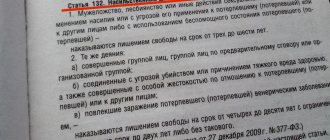1. Sodomy, lesbianism or other actions of a sexual nature with the use of violence or with the threat of its use against the victim (victim) or other persons, or taking advantage of the helpless state of the victim (victim) -
shall be punished by imprisonment for a term of three to six years.
2. The same acts:
a) committed by a group of persons, a group of persons by prior conspiracy or an organized group;
b) associated with a threat of murder or infliction of grievous bodily harm, as well as committed with particular cruelty towards the victim or other persons;
c) resulting in infection of the victim (victim) with a venereal disease, -
shall be punishable by imprisonment for a term of four to ten years, with or without restriction of freedom for a term of up to two years.
3. Acts provided for in parts one or two of this article, if they:
a) committed against a minor (minor);
b) caused through negligence the infliction of grievous harm to the health of the victim (victim), infection of him (her) with HIV infection or other grave consequences, -
shall be punishable by imprisonment for a term of eight to fifteen years with deprivation of the right to hold certain positions or engage in certain activities for a term of up to twenty years or without it and with restriction of freedom for a term of up to two years.
4. Acts provided for in parts one or two of this article, if they:
a) caused by negligence the death of the victim(s);
b) committed against a person under fourteen years of age -
shall be punishable by imprisonment for a term of twelve to twenty years with deprivation of the right to hold certain positions or engage in certain activities for a term of up to twenty years or without it and with restriction of freedom for a term of up to two years.
5. Acts provided for in paragraph “a” of part three and paragraph “b” of part four of this article, if they:
a) committed by a person who has a criminal record for a previously committed crime against the sexual integrity of a minor;
b) committed against two or more minors;
c) are associated with the commission of another grave or especially grave crime against a person, with the exception of the cases provided for in paragraph “k” of part two of Article 105 of this Code -
shall be punishable by imprisonment for a term of fifteen to twenty years with deprivation of the right to hold certain positions or engage in certain activities for a term of up to twenty years, or life imprisonment.
- Article 131. Rape
- Article 133. Compulsion to perform actions of a sexual nature
Commentary to Art. 132 of the Criminal Code of the Russian Federation
The object of violent acts of a sexual nature coincides with the object of rape (see commentary to Article 131 of the Criminal Code of the Russian Federation).
The objective side of the crime consists of committing sodomy, lesbianism or other acts of a sexual nature using violence or the threat of violence against the victim (victim) or other persons, or taking advantage of the helpless state of the victim (victim).
Sodomy is sexual contact between men, and lesbianism is sexual contact between women. Other actions of a sexual nature should be understood as satisfying sexual needs in other ways (oral, anal sex, etc.), including forcing a woman to commit sexual intercourse by using violence or threatening to use it.
Sodomy (a type of homosexuality, pederasty) consists of the forcible satisfaction of sexual passion through sexual intercourse between man and man. Non-violent sodomy is not punishable under the Criminal Code of the Russian Federation.
Lesbianism (sapphism, tribady) is the forced satisfaction of sexual passion through communication between a woman and a woman, acting on the erogenous zones of the partner’s body, imitation of sexual intercourse, and the performance of other lustful acts (oral-genital contacts, satisfaction of sexual needs with the help of various devices - artificial phalluses, vibrators, masturbation, petting, orotage, etc.). Victims of sexual assault can be both men and women.
From the subjective side, violent acts of a sexual nature are committed intentionally (in the form of direct intent) - the perpetrator is aware that he is committing this crime with the use of violence, and wants to do so. The motive of the crime is the satisfaction of sexual passion. In some cases, the motives may be revenge and humiliation of the victim’s human dignity.
The subject of a crime in case of forced sodomy can only be a male person, and in case of forced lesbianism - only a female person who has reached the age of fourteen. Persons of a different sex who take part in violent acts of a sexual nature (women in sodomy, men in lesbianism) are held accountable as accomplices - organizers, instigators, accomplices.
All other signs of sexual assault are similar to the signs of rape discussed above.
"Sin of Sodom"
Thinking about the question “Sodomy – what is it?”, you inevitably begin to remember the Bible. And indeed: this word came into the Russian language from Church Slavonic, and specifically from religious law. In it, this term initially meant exclusively anal sex between two men.
A synonym for the term “sodomy” in church law is also the later name “sodomy,” borrowed from European languages. This term is associated with the biblical legend about the city of Sodom, whose inhabitants became famous for such perverted behavior that they even began to pester the angels who came to the city to the only righteous Lot. It should be noted that in the ecclesiastical legal sense, sodomy is not only sodomy, but also all other sexual practices considered vicious from the point of view of the Church (masturbation, oral sex, even extramarital affairs).
Judicial practice under Article 132 of the Criminal Code of the Russian Federation
Ruling of the Supreme Court of the Russian Federation dated February 21, 2017 N 5-UD17-9
By the verdict of the Tushinsky District Court of Moscow dated May 12, 2009, I. (previously convicted) was convicted: under Part 1 of Art. 115 of the Criminal Code of the Russian Federation - to six months of correctional labor with the withholding of 10% of wages to the state; according to paragraphs “b”, “c”, part 2 of Art. 131 of the Criminal Code of the Russian Federation - to five years in prison; according to paragraphs “b”, “c”, part 2 of Art. 132 of the Criminal Code of the Russian Federation - to five years in prison. Based on Part 3 of Art. and clause “c” of Part 1 of Art. According to the Criminal Code of the Russian Federation, for the totality of crimes, by partial addition of punishments, I. was finally sentenced to seven years in prison.
Resolution of the Presidium of the Supreme Court of the Russian Federation dated March 14, 2018 N 306P17
Abdurakhmonov Saidmurod Bekovich, ... convicted on January 20, 2010 under clause “d”, part 2 of art. 161, part 1 art. 161, part 1 art. 115 of the Criminal Code of the Russian Federation to 2 years 6 months in prison, released on July 18, 2011 after serving his sentence, was detained on August 16, 2012 in accordance with Art. Art. 91, 92 of the Code of Criminal Procedure of the Russian Federation on suspicion of committing a crime under paragraph “b” of Part 4 of Art. 132 of the Criminal Code of the Russian Federation.
Resolution of the Presidium of the Supreme Court of the Russian Federation dated April 4, 2018 N 17-P18
Petrov Alexander Vasilyevich, ..., convicted on April 3, 2007 under clause “b”, part 2 of art. 131, paragraph “b”, part 2, art. 132 of the Criminal Code of the Russian Federation to 8 years in prison, released on March 7, 2013 after serving his sentence, was detained on December 20, 2015 in accordance with Art. Art. 91 and 92 of the Code of Criminal Procedure of the Russian Federation on suspicion of committing a crime under Part 3 of Art. , paragraph “b”, part 2, art. 158 of the Criminal Code of the Russian Federation.
Appeal ruling of the Judicial Collegium for Criminal Cases of the Supreme Court of the Russian Federation dated July 31, 2018 N 56-APU18-9
Chernov Anatoly Anatolyevich, ... born in 1984, ..., on December 25, 2014, convicted by the Sovetsky District Court of Vladivostok under Part 1 of Art. 132 of the Criminal Code of the Russian Federation to 2 years 6 months of imprisonment suspended with a probationary period of three years,
Resolution of the Presidium of the Supreme Court of the Russian Federation dated July 11, 2018 N 84P18
Anikeev Alexander Dmitrievich, ... convicted: February 16, 2010 by the Leninsky District Court of Nizhny Tagil, Sverdlovsk Region under paragraphs “b”, “c”, part 2 of Art. 131, part 3 art. , paragraphs “b”, “c”, part 2 of Art. 132, part 3 art. of the Criminal Code of the Russian Federation to 2 years 6 months of imprisonment, released after serving the sentence on January 24, 2012; On July 10, 2013, by the Kirovsky District Court of Yekaterinburg under clause “a”, part 2 of art. 158 of the Criminal Code of the Russian Federation to 1 year of correctional labor, -
Appeal ruling of the Judicial Collegium for Criminal Cases of the Supreme Court of the Russian Federation dated December 27, 2018 N 51-APU18-16
The court's conclusion that the act of which Mirsaidov D.D. is accused is also punishable under the Criminal Code of the Russian Federation and corresponds to Part 1 of Art. 132 of the Criminal Code of the Russian Federation, which provides for punishment in the form of imprisonment for a term of over 1 year, as well as the crime provided for in Part 1 of Art. 139 of the Criminal Code of the Republic of Tajikistan, of which Mirsaidov D.D. is accused, is confirmed by the case materials.
Appeal ruling of the Judicial Collegium for Criminal Cases of the Supreme Court of the Russian Federation dated 01.03.2019 N 48-APU19-1
Kolmogortsev Sergey Vladimirovich, ... convicted: 1) January 16, 1998 under clauses “b”, “c”, part 2 of Art. 131, paragraphs “b”, “c”, part 2 of Art. 132 of the Criminal Code of the Russian Federation to 12 years 6 months of imprisonment; 2) April 14, 1998 under Art. 119, paragraph “a”, part 2, art. 166, paragraphs “a”, “b”, “c”, part 2 of Art. 162 of the Criminal Code of the Russian Federation, part 3 and part 5 of Art. of the Criminal Code of the Russian Federation to 14 years 9 months of imprisonment, released on July 6, 2013 after serving the sentence; 3) February 14, 2014 under Part 1 of Art. 161 of the Criminal Code of the Russian Federation to 2 years of suspended imprisonment with a probationary period of 2 years. The suspended sentence was canceled on the basis of Part 4 of Art. of the Criminal Code of the Russian Federation according to the verdict of October 23, 2014 with a sentence of 2 years 10 days of imprisonment, released on June 10, 2016 after serving the sentence,
Resolution of the Presidium of the Supreme Court of the Russian Federation dated October 31, 2018 N 158P18PR
By the verdict of the Saratov Regional Court dated November 20, 2022, M. was convicted under paragraph “k” of Part 2 of Art. 105 and paragraph “b”, part 3, art. 132 of the Criminal Code of the Russian Federation. On March 6, 2018, the Judicial Collegium for Criminal Cases of the Supreme Court of the Russian Federation overturned this verdict and issued a guilty appeal verdict, which found M. guilty of committing crimes under Part 1 of Art. 105 and paragraph “b”, part 3, art. 132 of the Criminal Code of the Russian Federation.
Appeal ruling of the Judicial Collegium for Criminal Cases of the Supreme Court of the Russian Federation dated July 23, 2019 N 88-APU19-6
- November 13, 1997 by the Seversky City Court of the Tomsk Region under paragraph “c” of Part 3 of Art. 132 of the Criminal Code of the Russian Federation (taking into account the decision of the Presidium of the Tomsk Regional Court dated April 14, 1999) to 8 years of imprisonment in a maximum security correctional colony, released on parole on April 30, 2003 based on the decision of the Oktyabrsky District Court of Tomsk dated April 25, 2003 ;
Cassation ruling of the Judicial Collegium for Criminal Cases of the Supreme Court of the Russian Federation dated 08/06/2019 N 92-UD19-4
Convicted under paragraph “g” of Part 2 of Art. 162 of the Criminal Code of the Russian Federation to 9 years in prison with confiscation of property, clause “c”, part 2 of Art. 132 of the Criminal Code of the Russian Federation to 7 years in prison, part 2 of Art. 325 of the Criminal Code of the Russian Federation to a fine of 8,400 rubles, on the basis of Part 3 of Art. The Criminal Code of the Russian Federation for the totality of crimes imposed 15 years of imprisonment with confiscation of property and serving the sentence in a maximum security correctional colony; the punishment in the form of a fine was ordered to be carried out independently. The punishment under the verdict of March 3, 2000 was decided to be carried out independently.
Appeal ruling of the Judicial Collegium for Criminal Cases of the Supreme Court of the Russian Federation dated August 15, 2019 N 20-APU19-10sp
Bakhishev Imran Alimuradovich, ... convicted by the verdict of the Cheryomushkinsky District Court of Moscow dated January 26, 2022 under Part 1 of Art. 131, paragraph “a”, part 2, art. 132 of the Criminal Code of the Russian Federation to 7 years in prison, -
Tolerant USSR?
In the early Soviet years, homosexuality was not prohibited. The old law of the times of the Russian Empire was not in effect, and in the new criminal laws there was no liability.
Moreover, the leadership of the Union even suppressed attempts to introduce punishment for this in the criminal law of individual republics. The USSR of the twenties, not without reason, was considered a model of tolerance for sexual deviations. There was no article for sodomy in the USSR at that time.
Trusting relationship
If you are purposefully looking for a defense attorney for a criminal trial, then stop for long and appreciate the benefits of working with me. I have extensive experience in conducting criminal cases in courts of various levels - from magistrates to cassation courts. In addition to the courts, as part of the preliminary investigation, I defend my clients at the stages of inquiry and investigation in various authorities. The range of articles of the criminal code under which my clients were prosecuted covers a significant number of cases, about a third of which I was able to dismiss in court on various grounds. The problem of choosing a reliable defender is easily solved if you encounter it for the first time in your life. You must be guided by the following rules: a lawyer must have a valid status and be a member of the bar chamber of his region - this information can be checked on the chamber’s website (at the bottom of this page, click the St. Petersburg Chamber icon); After the consultation, you received answers to your questions and the potential defense lawyer declares his readiness to handle your case. Don’t waste your time, entrust your case to a professional lawyer - Vyacheslav Vostokov.
Important
As a rule, a detained person is first placed in a Temporary Detention Facility (IVS), and some time after a preventive measure in the form of detention is taken against him, he is transferred to a Pre-trial Detention Facility (SIZO). Sometimes, while the investigation is ongoing, the accused are kept in pre-trial detention center for months together with murderers and so-called “thieves”. Among these persons, Article 132 of the Criminal Code is not respected, which causes conflicts.
Timely involvement of a lawyer is necessary to protect the suspect/accused from violation of his rights (including in a pre-trial detention center), appeal against decisions of the investigator and the court, as well as build the correct legal position on the case before the start of investigative actions (interrogations, confrontations). Lawyer Vyacheslav Vostokov is ready to provide you or your loved one with qualified defense in a criminal case - come for a consultation.
Qualified defense
The participation in a criminal case of a qualified defense attorney by agreement - lawyer Vyacheslav Vostokov - is a guarantee of developing the correct position against the charges brought. Use the opportunity to regularly receive professional advice on your case, and you will gain a noticeable advantage against the pressure of the investigative authorities, the prosecutor's office and the court. I am carrying out comprehensive work to challenge the prosecution's version. I conduct my own legal investigation, help my client develop a defense version, and collect evidence. My clients, if they end up in a pre-trial detention center, are not left without legal and moral support. I visit the pre-trial detention center and carry out all the necessary work with the client there. My clients feel confident in court.
- I am conducting comprehensive work to challenge the prosecution’s version.
- With my participation, the principal is protected from pressure from law enforcement agencies.
- I comply with the requirements of professional ethics.
Work for results
The sooner you contact me, the more effective the results of my help will be. I have extensive experience in criminal defense, both at the preliminary investigation stage and in court. In the vast majority of cases, I achieve the planned result. The experience I have developed over the years in legal assistance on a wide range of crime charges - from minor to particularly serious ones - allows me to confidently defend my clients. In addition to my own experience, I also participate in seminars and listen to advanced training lectures, which are conducted jointly with colleagues from the legal community. Feel free to contact me for advice. A criminal case is not yet a verdict!
The cost of defending a lawyer under Art. about sexual assault
| Name of the service provided | Service cost |
| Consultation | 5,000 rub. |
| On-site consultation | 7,000 rub. |
| Fixed price for doing business from the beginning | from 40,000 rub. |
| Fixed price of the case when applying during the investigation process | from 60,000 rub. |
| Hourly payed job | 2,000 rub. |
| One-time visit | from 10,000 rub. |
| Studying the case of a client in jail | from 15,000 rub. |
Abolition of criminal penalties
However, since the 70s, the opinion began to spread in the USSR that criminal penalties for sodomy should be abolished. For example, there is a well-known joke: “Putting a homosexual in prison is the same as sentencing an alcoholic to correctional labor at a distillery.” More seriously, it was argued that the mere immorality of actions should not be considered a crime. However, until the very end of the USSR, responsibility remained.
The situation changed after the collapse of the Union and the declaration of Russian independence. Although in the first years of the existence of the Russian Federation, sodomy was still considered a crime (the old Soviet law was still applied), in 1993 the article was changed. From that moment on, punishment was imposed only for forced sodomy or for sex with a minor.







